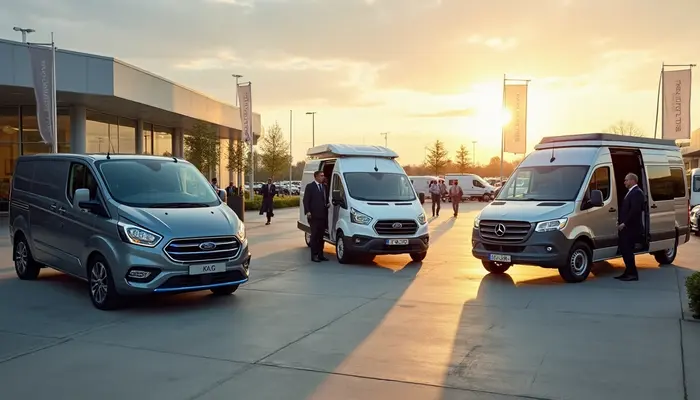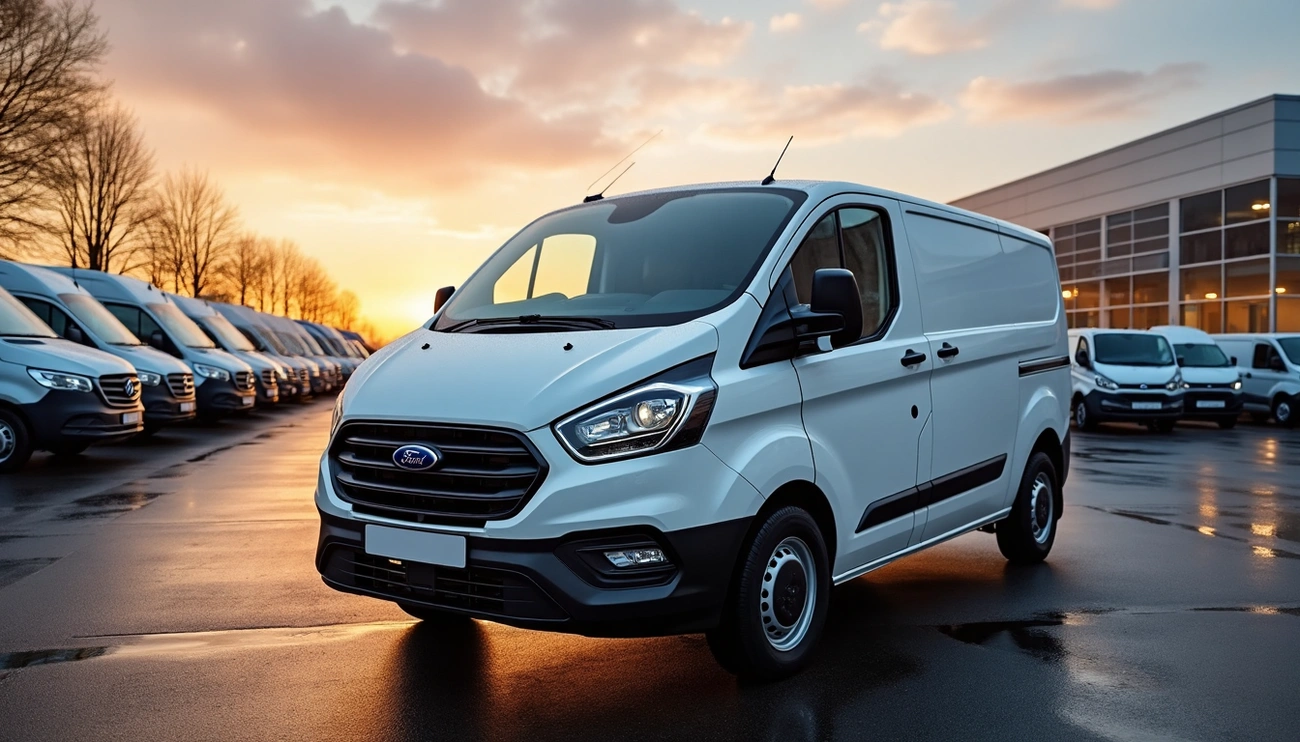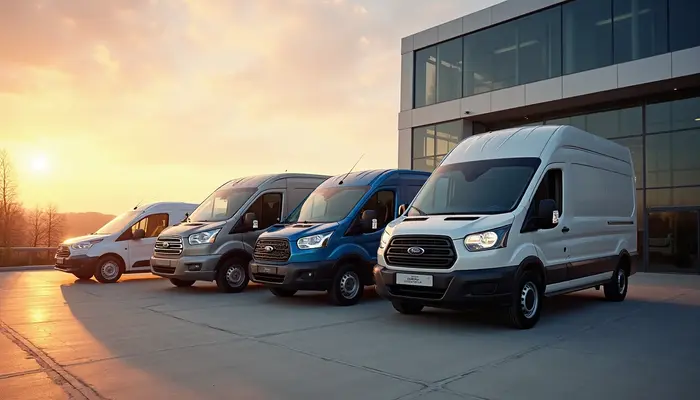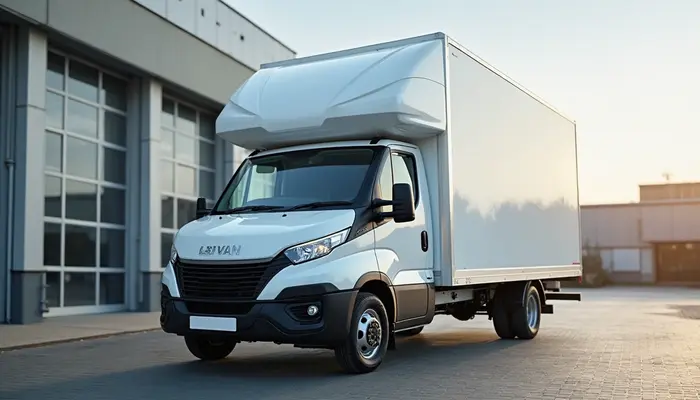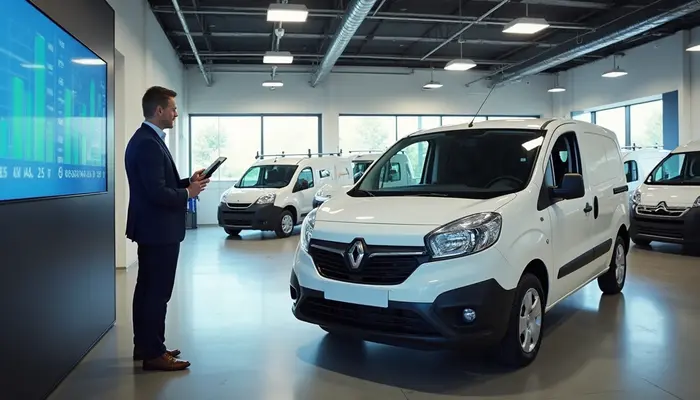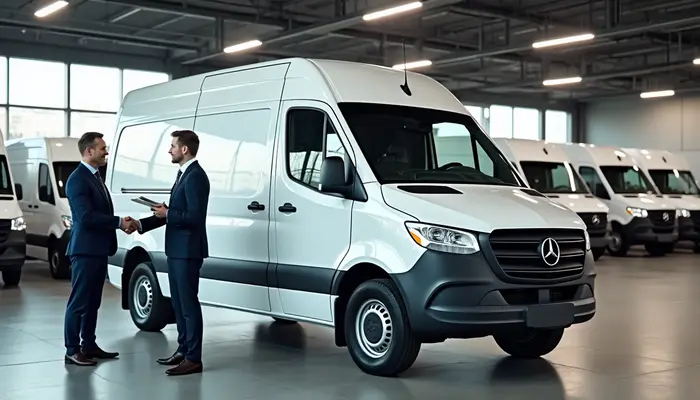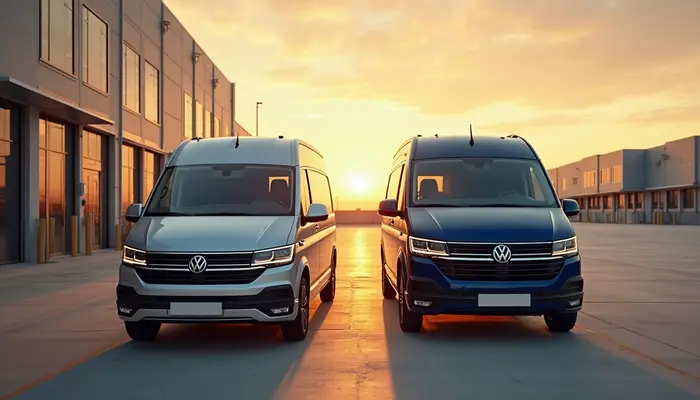Van Sales 2025 Guide
The van sales world has changed by a lot as we approach 2025. Electric models like the Ford E-Transit now run an impressive 250 miles on one charge. The commercial vehicle world is changing faster than ever. The recent 25th Commercial Vehicle Show proved this point. Manufacturers like Kia, Renault, and Isuzu showed off their state-of-the-art electric vans and pickup trucks. Source
You might be learning about used van options or thinking about buying a camper van. Today’s market needs a fresh understanding of what’s available. Van Monster has grown to more than 100 dealerships throughout the UK. Big Van World tells us that 70% of their customers buy their vehicles just by talking on the phone. The choices range from compact Vauxhall Combos to roomy Ford Transits. This piece will help you understand your options better. You’ll learn how to find trustworthy sellers in your area and get the best deal with the right financing plan. See luton vans for sale
Understanding the Van Market in 2025
The van market has changed a lot in 2025. Used and new segments are heading in opposite directions. Buyers need to understand these current van sales patterns to make smart choices. See all van lease deals
New vs. used van sales: What’s changed?
Used van sales started 2025 strong. The first quarter showed a 21% jump in sales compared to last year. The new van market isn’t doing as well. April marked the fifth month in a row where registrations dropped, down 14.9% from last year. These numbers show how money pressures are changing what people buy. See vans for sale scotland
The price story gets interesting too. Used van prices went up by £554 between February and March 2025. About 22% of vans sold above guide price. The used market has a clear split – just 15.4% of vans are ‘prime’ (under three years old with less than 60,000 miles). The other 84.6% have clocked an average of 113,718 miles. This split creates different options for different buyers. See all VW Transporter for sale
Older used vans remain popular because they cost less. Their average price of £5,625 makes them good options when money’s tight. See all VW vans for sale
Trends in commercial and camper van sales
Campervan and motorhome sales have boomed. Between July 2020 and June 2021, 16,608 new motorhomes hit the road – that’s 8.25% more than before COVID. New motorhome sales have hit a record £1.15 billion yearly. See all Ford Custom for sale
People are buying more campervans because:
- They prefer UK holidays
- They want outdoor activities and countryside access
- They can avoid airport hassles
- They can work from anywhere with Wi-Fi
- They like the built-in social distancing
Campervans attract both old fans and younger first-time buyers. Business buyers now prefer medium-sized and small vans. The biggest models saw a 22.9% drop to 12,113 units in April. See all Crew Cab Vans for sale
How electric vans are shaping the future
Electric vans are changing the game. Battery electric van (BEV) sales jumped 77.5% to 1,686 units in April. That’s seven months of steady growth. Electric vans make up 8.3% of all sales this year.
The government wants 16% of vans to be zero-emission by 2025. Makers have invested heavily in EV tech. More than half of all van models now come with zero-emission options. Still, some roadblocks remain.
Used electric vans are showing up more at auctions – up 62.6% in Q1 2025. These vans are newer, averaging 42 months old with 29,000 miles. Buyers remain cautious though. Only four in ten electric vans sell first time at auction.
Experts say the biggest problem is poor charging infrastructure for business vehicles. The limited government support beyond the Plug-in Van Grant doesn’t help. This puts off cost-conscious business buyers who dominate the market. See all Business Van Lease
Types of Vans and Their Uses
Your specific needs should guide your van choice in 2025. The market offers everything from workhorses for trades to leisure vehicles for weekend adventures. Let’s take a closer look at van sales options to help you make the right choice.
Panel vans vs. pickup trucks
Panel vans are the most common commercial vehicles on UK roads today. These versatile workhorses come with enclosed cargo spaces without side or rear windows. This makes them perfect for keeping goods and equipment secure. The Ford Transit and Volkswagen Transporter are popular choices that come in different sizes with varying roof heights and wheelbases to fit any business need.
Pickup trucks take a different approach with their open cargo bed at the rear. They work best when you need to move bulky items that don’t need protection from weather or theft. The market leaders are the Ford Ranger, Toyota Hilux, Volkswagen Amarok, and Mitsubishi L200. You can get them in single or double cab versions.
Here are the main differences to think about:
- Security: Panel vans keep your cargo safe from theft and weather, while pickup loads are exposed.
- Loading ease: You can load and unload bulky items more easily with a pickup’s open bed.
- Maneuverability: Panel vans like the Transit Custom turn better in tight spaces (10.9m) than pickups like the Ranger (12.4m). This makes them ideal for city driving.
- Off-road capability: Pickup trucks handle rough terrain better thanks to higher ground clearance and strong 4×4 systems.
- Towing capacity: Pickups are towing champions. The Ford Ranger’s single-cab model can pull an impressive 3,500kg.
Best vans for small businesses
The right van can streamline processes for small businesses. Compact vans are easy to drive in cities and still offer good cargo space. The Ford Transit Courier is small but mighty – it fits 2.9 cubic meters of cargo (enough for two Euro Pallets) and carries up to 820kg.
The Vauxhall Combo sits in the middle range and offers great flexibility. It carries between 665kg and 1,002kg. The load length ranges from 1.5 to 2.1 meters to match different business needs.
Need more space? The Ford Transit Custom might be your answer. It offers up to 6.8m³ of loadspace and carries up to 1,327kg. Courier services and removal companies love this van.
Camper vans for travel and leisure
The campervan market is booming with both experienced travelers and newcomers jumping on board. Today’s camper conversions turn regular panel vans into cozy mobile homes with beds, kitchenettes, and sometimes bathrooms.
Leisuredrive specializes in turning vehicles like the Volkswagen T7 into luxury campervans. Their conversions feature handmade kitchens, Thetford cassette toilets, and clever seating that becomes single or double beds. You’ll also get various lighting options, plenty of storage with wardrobes and drawers, and good insulation.
AddVenture caters to outdoor enthusiasts with special designs. Their vans include bike storage, paddle-board mounts, and off-grid features. These additions are perfect for cyclists, hikers, and water sports fans who love remote adventures.
Want to try before you buy? Experts suggest renting a campervan first. This helps you see if the lifestyle fits and which setup works best for your travel style. It’s worth testing since new conversions cost between £25,000 and £75,000.
Where to Buy: Online vs. Local Dealerships
The right place to buy your van is just as significant as picking the vehicle itself. The van-buying world gives you several options. Each option has clear advantages based on your priorities.
Benefits of buying from local dealers like Falkirk van sales
Local dealerships give you an individual-specific experience that other channels can’t match. A visit to places like Advantage 4 Vans in Bristol shows you a wide range of new and used vans for business and personal use. Most trusted local dealers check their vehicles before sale. They often run an 82-point inspection to ensure quality.
The benefits of purchasing from local dealers include:
- Face-to-face interactions with knowledgeable sales staff who answer questions right away
- A chance to physically inspect and test drive multiple vehicles in one location
- Available financing options through long-standing relationships with multiple lenders
- Warranties and service contracts that give peace of mind after purchase
- Professional handling of all paperwork including registration and taxes
Local dealerships also offer aftercare services that private sellers can’t provide. Many dealers now include breakdown coverage. Some even give up to 12 months of free RAC breakdown assistance that fixes 4 out of 5 breakdowns instantly.
Learning about online platforms and remote buying
Online platforms have changed van purchasing and made the process more available than ever. Major used van retailers now run strong websites that show their inventory with detailed specs and high-quality images. Many buyers feel confident buying without seeing the vehicle first.
We looked at online shopping mainly for its convenience and wide selection. You can check hundreds of vans from multiple sellers from your couch and compare prices and specs easily. Some platforms also handle vehicle history checks and financing options to streamline the process.
What to expect from van sales near me
A search for “van sales near me” will show you many local options. Good preparation leads to successful local purchases. Research the dealer’s reputation and inventory online before visiting. You’ll find vans of different ages and conditions—from “prime” low-mileage vehicles to higher-mileage options.
It’s worth mentioning that you should be careful when buying from private sellers through online sites like Gumtree. The RAC suggests never paying until you’ve seen the vehicle and done the needed checks. Dealers like Huntswood Van Center offer safer options with fully inspected vehicles that meet strict safety and performance standards.
What to Check Before You Buy
A detailed inspection before buying a van helps avoid mistakes that can get pricey. Your thorough check will reveal issues you might miss at first glance and save thousands in repairs later.
Mechanical and electrical inspections
Professional pre-purchase inspections cost between £116 and £185 but are a great way to get peace of mind. These inspections examine critical components like the engine compartment, electrical controls, suspension, steering, clutch, transmission, exhaust system, fuel system, brakes, and wheels and tires. The inspector takes the van on a 5 to 10-mile road test to check its real-life performance.
The brakes should feel firm, not spongy, especially if the van has high mileage or hauled heavy loads. Your steering wheel needs to respond smoothly without pulling sideways.
Vehicle history and mileage verification
One in four vans has hidden issues, while one in eight has outstanding finance. You should check the MOT history through the government website that shows test results, recorded mileage, and failed parts from previous inspections.
“Clocking” or mileage fraud shows up in one out of 11 vans. Cross-checking the odometer reading with the National Mileage Register helps spot any discrepancies.
Cosmetic condition and cleanliness
The van’s appearance reveals its maintenance history. Check for body damage like dents, scratches, and rust, especially under wheel arches. Even grade one used vans (the highest quality grade) might have small defects such as dents covering one-third of a panel or scratches on two panels.
The load area deserves extra attention—normal wear from regular use is fine, but bent panels change the vehicle’s grade and could affect how it works.
Warranty and aftersales support
Manufacturer warranties usually cover a vehicle for three years or 60,000 miles, whichever comes first. Some brands like Nissan and Maxus give longer five-year warranties. After the original warranty runs out, Mechanical Breakdown Insurance offers continued protection.
Missing scheduled services, repairs at unauthorized garages, or modifications can void your warranty. Good aftersales support adds security and substantially affects your ownership experience.
Financing and Ownership Options
Your van purchase financing strategy matters just as much as picking the right vehicle. The 2025 market offers several options, and knowing the financial impact of each choice can help you save thousands throughout your van’s life.
Leasing vs. buying: Which is better?
The simple difference between leasing and buying comes down to ownership. You own the van after paying for it when buying, while leasing means monthly payments and usually returning the vehicle when the contract ends. Both paths have their advantages based on your situation.
Leasing benefits include:
- Monthly payments that help you plan business cash flow better
- You get newer models every few years
- No worries about depreciation
- Special maintenance packages buyers can’t access
- VAT-registered businesses can deduct monthly payments for tax purposes
Buying gives you full ownership, unlimited mileage, and the freedom to customize your van. You might save money in the long run once you finish the payments. Leasing needs you to estimate your mileage upfront and keep the van in good shape. Many businesses prefer this structure because it makes expenses more predictable.
Understanding van finance packages
The market has more options than just leasing or buying. Contract Hire works as a simple rental agreement that many choose for its straightforward nature. Hire Purchase lets you own the van gradually through payments that match your budget.
Personal Contract Purchase (PCP) gives you three choices when the term ends: pay the final amount to own the van, give it back, or use any extra value above the guaranteed future price toward a new vehicle. Finance Lease offers lower monthly costs plus a chance to profit from selling the van later.
Business customers often choose Business Contract Hire with its fixed rental period, usually 24-60 months. This starts with an upfront payment followed by monthly installments. Adding maintenance packages helps avoid surprise costs.
Part exchange and resale value
Trading in your current van through part exchange makes upgrading easier than private selling. The dealer subtracts your existing van’s value from your new vehicle’s price.
Several things affect your part exchange value. The van’s age, brand, and model substantially influence its worth, with newer vehicles naturally fetching more. Vans with fewer miles are worth more, and a solid service history can boost value up to 20%.
Getting ready for part exchange means gathering your paperwork: V5C logbook, MOT certificate, service records, manual, and all keys. Dealers usually handle any remaining finance on your current van, applying leftover equity to your new purchase.
Conclusion
The van market in 2025 shows some interesting trends. Used van sales jumped by 21% while new van registrations dropped by 14.9%. This data shows how buyers’ priorities have changed during tough economic times. Electric vans are game-changers in the industry, but buyers still worry about charging stations and reliability.
Your specific needs are the most vital first step before you buy. Panel vans give businesses security and versatility. Pickup trucks work better off-road and can tow more weight. Small businesses do well with compact options like the Ford Transit Courier. Adventure seekers often pick specialized camper conversions.
Where you buy your van matters just as much. Local dealerships give you customized service and let you inspect vehicles right away. Online platforms are more convenient and have more options. Whatever path you choose, getting a full picture before buying is key. Never skip checking the vehicle’s history, mechanical condition, and warranty details.
The way you finance your van will affect how happy you are with it over time. Leasing gives you flexibility and fixed monthly costs. Buying lets you avoid mileage limits and customize your van. Part exchange makes upgrading easier if you’ve managed to keep your current vehicle in good shape.
The right van comes from good research, proper inspection, and smart financing. This piece gives you the tools to make a smart choice that fits your needs. Take your time looking – you’ll end up with the perfect van that works for years to come.
FAQs
Q1. What are the main differences between panel vans and pickup trucks? Panel vans offer enclosed, secure cargo spaces ideal for transporting goods and equipment, while pickup trucks have open cargo beds better suited for bulky items. Panel vans generally provide better maneuverability in urban environments, whereas pickup trucks excel in off-road conditions and typically have superior towing capacities.
Q2. How has the electric van market evolved in recent years? Electric van registrations have seen significant growth, with a 77.5% increase in April 2025 alone. However, adoption faces challenges such as insufficient charging infrastructure for commercial vehicles and limited government incentives. The used electric van sector has also experienced a surge, with vehicles averaging just 42 months old and 29,000 miles.
Q3. What should I consider when buying a used van? When purchasing a used van, it’s crucial to conduct thorough mechanical and electrical inspections, verify the vehicle’s history and mileage, check for cosmetic damage, and understand the warranty and aftersales support options. Professional pre-purchase inspections, typically costing between £116 and £185, can provide valuable peace of mind.
Q4. Is it better to lease or buy a van? The choice between leasing and buying depends on your specific circumstances. Leasing offers fixed monthly payments, access to newer models, and potential tax benefits for businesses. Buying provides complete ownership, unlimited mileage, and customization options. Consider your long-term needs, budget, and business requirements when making this decision.
Q5. How can I maximize the resale value of my van? To maximize your van’s resale value, maintain a strong service history, which can increase value by up to 20%. Keep mileage low, as this significantly impacts valuation. Before part-exchanging, gather all essential documentation including the V5C logbook, MOT certificate, service records, owner’s manual, and all vehicle keys. Regular maintenance and keeping the van in good condition will also help preserve its value.

